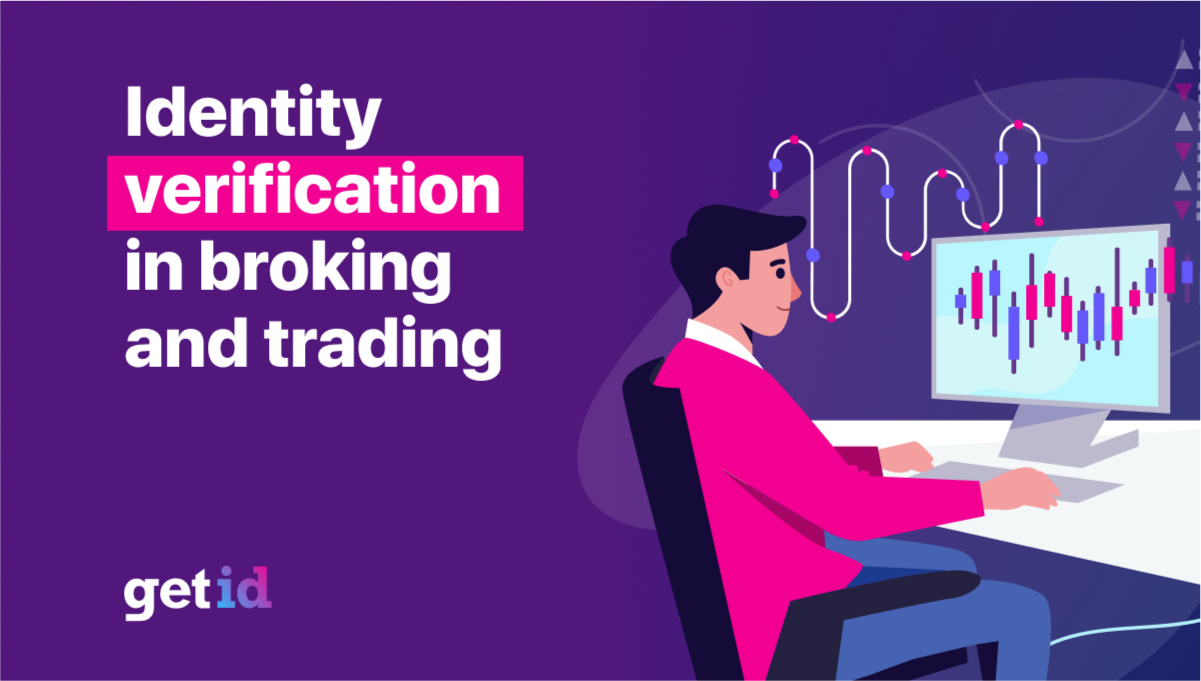
Boom or bust? Identity verification in broking and trading
27 Jul 2020
Introduction to broking and trading
The stock exchange is one of the fundamental ways to access the global financial system and capital markets. This provides ample opportunities for bad actors to engage in criminal activities and abuse the system for financial gain. GetID’s identity verification solution reduces compliance risk and seamlessly automates the onboarding process.
“Was all this legal? Absolutely not but we were making more money then we knew what to do with”. The famous quote by Jordan Belfort in the movie ‘The Wolf of Wall Street’. The movie showcases one compliance breach after another – mis-selling penny stocks, securities fraud, stock market manipulation – the list goes on! Trading in financial products always involves a risk. Ask any brokerage or trading firm about risk, and they’ll tell you balancing risk against profitability is part and parcel of the game. However, when the appetite for risk is higher than what is permitted by the authorities, invariably there is a fallout and the implications can be far-reaching: lawsuits, regulatory fines, FBI investigations, imprisonment.
The importance of Know Your Customer (KYC) can not be understated. KYC is a vital component for any brokerage or trading firm and makes the difference between success and failure. The aim of AML regulations is to create a harmonised, transparent, and regulated securities market. One of the fundamental components of the armoury to combat crime is to verify customer identity.
In this article we address compliance challenges in identity verification for online trading and brokerage firms, the reason why the industry is a target for money laundering, and how GetID’s ID verification software helps brokers and trading platforms to comply with the strict regulatory environment.
Market Size of Trading and Forex services
A broker is an individual or firm that acts as an intermediary between an investor, and a securities exchange buying or selling securities. Orders on the stock exchange can only be accepted from brokers who are members of the exchange in question. Once a transaction is completed, brokers receive a commission, fees from customers, or are paid by the securities exchange, or in some cases both. It’s a highly lucrative industry.
Brokers are grouped into two major groups: advisory and execution. Advisor brokers provide a range of services and are registered with the relevant regulatory body. An execution-only broker processes buying or selling on behalf of a client. They do not provide investment or advisory services.
Advisory and execution brokers are further subdivided into four main types – a stockbroker, forex broker, full-service broker, and discount broker, respectively. The role of a stockbroker is to buy and sell investment shares.
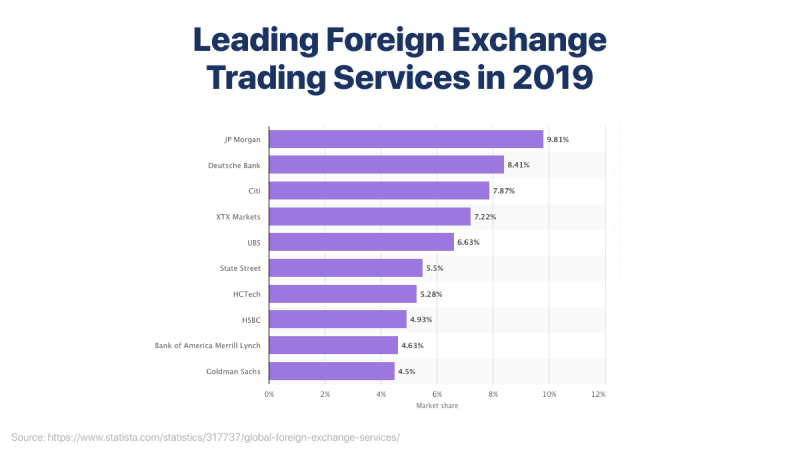
A forex broker deals in the buying and selling of currencies in pairs i.e. GBP/EURO. Full-service brokers offer a range of services such as tax advice, investment planning, and portfolio management. A discount broker only executes and typically charges a lower commission rate. Online trading platforms give individuals and businesses access to financial markets so they can choose to trade on indices, forex, shares, commodities, cryptocurrencies etc. The trading platform provides a visualisation of market data so you can manage your trade and perform price analysis. However, you need to connect to one or more brokers to place a trade on the market. Online trading platforms are divided into two main categories: traditional oriented type and distributed ledger – the same technology used in blockchain. Common assets like Exchange traded funds (ETFs), commodities, currencies and stocks reside on a Traditional orientated platform. Cryptocurrencies and virtual assets are on distributed ledger technology and blockchain.
Foreign exchange (Forex) services are largely over-the-counter, and are one of the most volatile markets in the world. Trading takes place on electronic platforms and via telephone lines between banks and other market participants. Today, the forex market is the most actively traded market in the world, trading more than $6.6 trillion every day. In the first quarter of 2020, the total value of global equity traded worldwide was estimated to be more than $32.5 trillion. The U.S. accounts for 19.5% of a global over-the-counter FX trade.
The first two quarters of 2020 have been tough times for stock exchanges in global markets. The coronavirus pandemic is having a worldwide impact and affecting stock markets. The response has raised concerns as well as questions. Volatility in forex, reduced online trading, and brokerage firms clients assets have for some businesses dropped by 15%.
The Financial crime landscape in securities
The securities sector is a risk dynamic industry. It is constantly changing and can be used to both launder illicit funds and generate illegal funds. Third party risks range from insider trading, market manipulation, fraud, to money laundering, terrorist financing, and corruption.
Money launderers like to disguise the money trail. Bad actors may use various methods to launder proceeds of crime. Spotting suspicious activity and red flags can be challenging for specialised compliance teams.
Complex corporate ownership structures and changes in share ownership can cause transparency issues and disguise the beneficiary. The use of offshore tax havens to evade or avoid tax and transfer wealth is prevalent. Other methods include using stock exchanges to deposit long-term funds, opening multiple accounts, ‘pump & dump’ schemes, and boiler room operations. There is a heightened risk of fraud, money laundering and terrorist financing in online trading. With strict regulations, stiff penalties and enforcement action, this industry can hold individuals and brokers liable and accountable for market abuse. Breaking the law can lead to fines, reputation damage, and criminal proceedings.
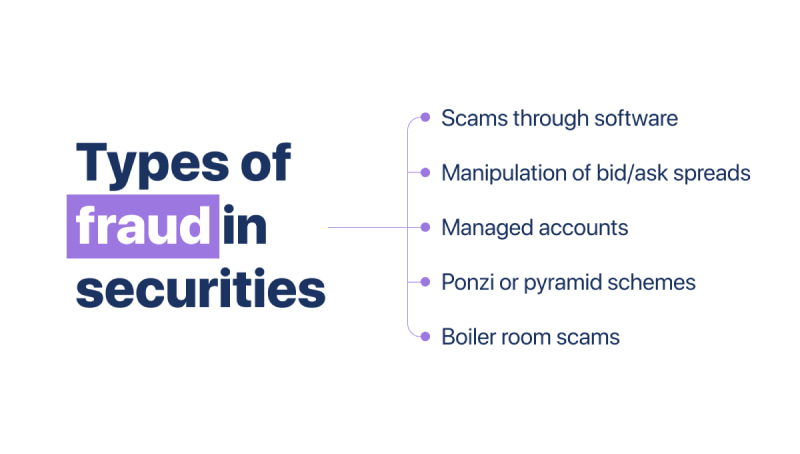
Regulatory overview of key jurisdictions in online trading
As broking and trading is a global activity, there isn’t one set of regulations that apply. Brokerage companies and online platforms are subject to regulations in different jurisdictions depending on the regions where they transact and operate.
In the E.U, the European Security and Markets Authority (ESMA) provides a single rulebook for financial markets to safeguard against risks and works closely with the European Banking Association (EBA) to reform the industry. They impose restrictions, risk assessments, and supervision on trading & brokerage activities.
MiFID II
The Markets in Financial Instruments Directive II (MiFID II) came into effect in January 2018 and covers virtually all aspects of trading within the EU from banks to stock exchanges, brokers, hedge funds and traders. The aim of MiFID II is to make E.U. markets safer, more transparent and efficient by harmonised regulation across E.U. financial markets. MiFID II regulates the operation of trading venues, processes, systems and governance by market trading entities.
Germany
The Germany regulatory authority BaFin operates as the independent regulator for brokers, investment funds, stock markets and other financial and insurance companies. BaFin is notorious in the industry and has a reputation for being one of the toughest regulators in the market with strict regulatory requirements. Forex services must conform to BaFin which falls under the MiFID II directive.
France
French financial markets are under the supervision of the central bank, Banque de France. It has direct links with the European Central Bank but there are other subsidiaries as well as banking supervisory agencies for online trading oversight. The various departments are responsible for overseeing a wide variety of financial organisations, including Forex brokers, financial institutions, insurance companies and others offering services to financial markets. Brokering and trading compliance in France also is under the scope of MiFID II, the E.U. money laundering directives, and other applicable regulations stipulated by the Autorité des Marchés Financiers – the primary regulator of financial markets enforcing AML obligations for businesses to comply with.
United Kingdom
The Financial Conduct Authority (FCA) regulates forex and brokerage firms and enforces strict oversight to ensure no fraud or money laundering is occurring in the market. Regulated entities must report transactions to prove they are following rules, regulations and official guidance. The Money laundering and terrorist financing (Amendment) 2019 regulations apply to U.K. regulated firms transposing the 5th EU money laundering directive into local law to combat money laundering and terrorist financing.
United States of America
Regulation in the U.S. is tough to say the least. Brokers and dealers handle large sums of cash and the U.S. government wishes to keep bad actors out due to a number of high profile scandals. The Securities and Exchange Commission (SEC) is a federal government agency regulating brokers-dealers, security exchanges, and Initial public offerings (IPOs). They handle criminal matters, and enforce stringent rules and regulations that all market entities must comply with. There’s numerous regulations that apply – from Sarbanes-Oxley which enhances corporate responsibility and financial disclosures, to the Dodd-Frank act that aims to promote transparency and protect consumers.
Running intrinsically with the SEC is FINRA’s own set of rules and regulations. FINRA has the powers to investigate and discipline firms and individuals in the event of securities violations and market abuse. The AML rule 3011 imposes minimum requirements for compliance including the need to implement policies and procedures to detect money laundering, and effective controls to ensure compliance with the Banking Secrecy Act (BSA).
Lastly, there’s the Department of Treasury’s Financial Crimes Enforcement Network (FinCEN) and other federal and state regulators which combine together to create a powerful matrix of regulatory and enforcement bodies ready to take action when brokerage-dealers flout the legal system. U.S. regulations must be taken seriously.
Sanctions and PEPs screening
A key part of achieving regulatory compliance is AML watchlist screening. Companies that do business with sanctioned jurisdictions pose a significant risk of violating sanctions law. Trading in U.S. dollar transactions brings companies and individuals under the scope of the U.S. Department of Treasury’s Office of Foreign Assets Control (OFAC) sanctions regime, irrespective if the business is based in the U.S. or a non U.S. firm. Brokerage firms need to manage trade compliance risk and screen against multiple sanction lists.
In addition to OFAC screening, it is mandatory to check individuals and companies against the United Nations consolidated sanctions list irrespective of the legal entity’s operational jurisdiction. The UN sanctions regime includes a list of targets ranging from terrorist organisations to politically exposed persons (PEP) in sanctioned and embargoed countries. This includes notorious political figures and dictators such as Bashar Assad, President of Syria, and Kim Jong-Un, Supreme leader of North Korea. A sanctioned persons passport and identification number is included in a sanction list if data is available. The E.U., and the U.K.’s Office of foreign sanctions implementation program make up the other remaining core sanction lists.
PEP clients can pose a risk to brokerage companies – bribery & corruption risks, money laundering, and terrorist financing. Furthermore, wealthy and powerful PEPs may be reluctant to provide full identity verification and customer due diligence (CDD) information. Also, PEPs may receive illicit funds and establish numerous brokerage accounts to launder proceeds of crime. Identification and verification of source of wealth and source of funds should be conducted for high-risk customers such as PEPs. KYC, CDD, and Enhanced due diligence (EDD) are all parts of the risk-based approach to manage third party risk and should be the cornerstone of a sound compliance program.
Why KYC is important
Brokerage companies must comply with a long list of regulations. These regulations have important implications for forex services and brokerage firms, particularly on how they onboard clients. The exhaustive list of compliance requirements can delay the onboarding process. It is the sole responsibility of the brokerage firm to implement account verification and KYC procedures. A mandatory requirement is to collect personal information for identity verification and customer authentication. Stock exchanges need to know who they are dealing with when money is exchanged between the two parties.
KYC information for individuals should cover:
- The customer’s name (first, middle and surname);
- Date of birth;
- Residential or business address;
- Proof of address such as utility bill, etc;
- Passport number, nationality, and country of issuance;
- Secondary form of identification i.e. drivers license, national identity document.
Additional information is required for onboarding legal entities and performing ‘Know Your Business’ checks. The broker takes on the responsibility of being the custodian of the account, funds, and paperwork. Each applicant must be approved and accepted by the brokerage firm before funding the trading account.
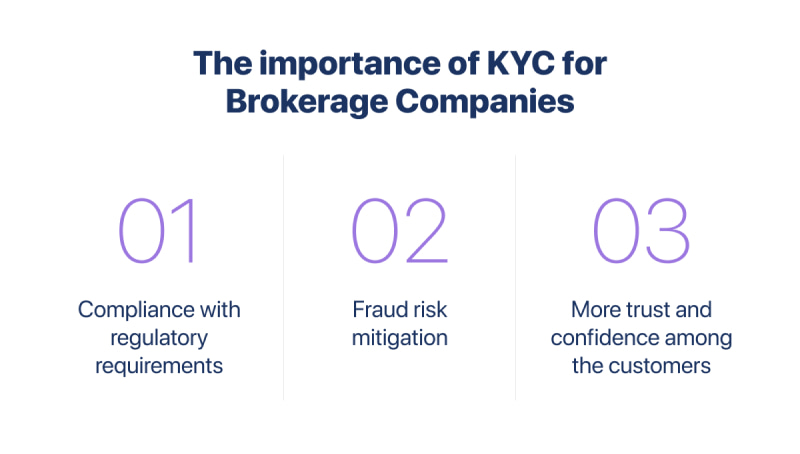
Client identity verification is crucial for brokerage companies to fulfill their legal and regulatory obligations. Information should be requested from new customers as well as existing ones. The broker should assess the suitability of the customer. An age verification check should be performed to check the person is not lying about his or her age. KYC software that offers real-time customer identity verification, user age verification, and trading account document verification, mitigates the risk of criminals using fake, stolen, or fictious identities to open accounts. Trading user identity verification, and user authentication protects your assets by stopping criminals at the door before they enter your house.
Along with KYC risk identification and mitigation measures, speed of execution is paramount: the quicker an account is opened, the faster trades can be executed. But broking and trading KYC can be complex, expensive, and time consuming requiring a plethora of checks during the account opening stage. Compliance teams still rely on manual, inefficient, error prone processes that slow down onboarding and the customer journey.
The current KYC flow involves multiple approval steps and going back-and-forth to the customer with requests for information. Some online platforms lack front-end validation and verification, sending back a ‘rejected’ response after some time has passed. Not only does this create unnecessary delays but delivers a poor customer experience with low conversion rates. Customers wish to trade immediately, and may abandon the service even before they have started. A study found 40% of online applications were abandoned due to length of time taken to complete an application. Efficiency in onboarding is the single biggest driver of customer success.
Balancing time and risk is paramount. Failures in client identity verification can lead to regulatory action. The Securities and Exchange Commission (SEC) dished out $1 million fine to a brokerage firm due to breaching AML rules by allowing entities to trade without verifying the identities of non-U.S. beneficial owners. The widening scope of KYC & AML regulations scrutiny is not just targeting large, household brokerages, but small, and medium sized firms are increasingly finding themselves subject to regulatory pressures. Given AML enforcement action, brokerage companies of all sizes must promote a culture of compliance and a positive ‘tone from the top’ to tackle risk & compliance issues that plague the industry.
GetID offers a proven solution for brokerage firms
Fraudsters and money launderers try to bypass controls by providing as little information as possible. Trading account verification and ensuring you have robust procedures and processes to verify customer identity should be top priority for compliance and KYC onboarding teams.
Due to the heightened risk of PEPs and Sanctions, using fully integrated screening and watchlist filtering functionality in KYC software for identity verification will allow you to onboard quicker.
GetID uses PEPs and sanctions intelligence directly from source and combines this with advanced name matching algorithms to reduce false positives and provide an integrated identity and watchlist filtering platform.
Using GetID’s fully automated online KYC software for trading and brokering, you can remove bottlenecks and streamline processes whilst remaining in control over KYC processes.
GetID offers a simple yet effective three-step process to onboard and verifying identities:
- Take a photo of your identity document from both sides;
- Take a selfie using your phone or desktop camera;
- Perform some random actions for liveness detection.
Onboarding complete. It really is as simple as that. This helps save time and reduce costs. Time is money: GetID’s faster onboarding solution lowers abandonment rates and increases top-line growth.
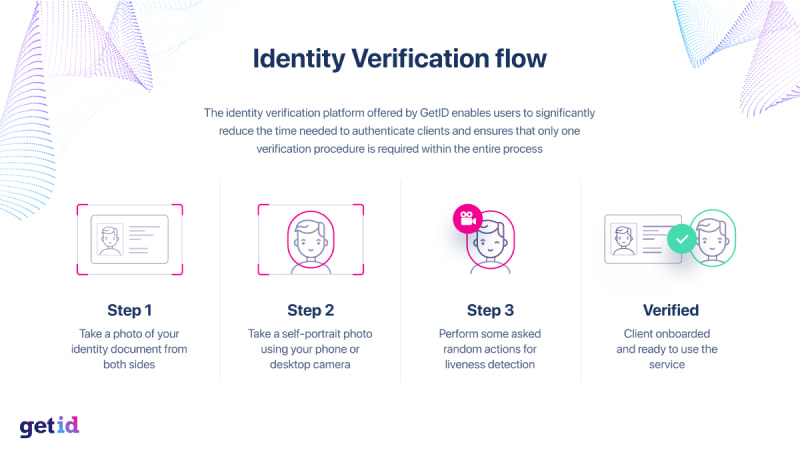
GetID integrates flawlessly with all the pre-existing systems of brokerage and trading firms with the help of API and SDK integrations. Advanced security, resilience and high assurance levels gives greater levels of protection.
The core benefits of using GetID include:
- Frictionless onboarding experience;
- Online age verification;
- Comply with AML & KYC Regulations;
- Reduce fraud, spoofing and deep-fakes;
- Liveness detection and biometric facial recognition.
GetID is a cost-effective, scalable solution with minimum setup costs that saves brokerage firms time and money.
Contact us today for a demonstration and see how we can add value to your onboarding process!